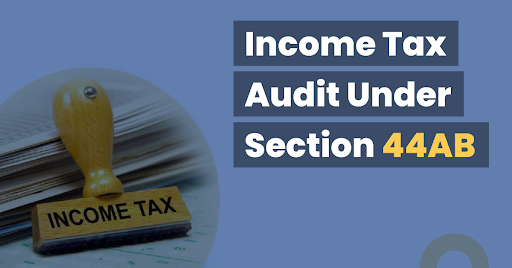For businesses to thrive, staying compliant with legal and regulatory frameworks is just as critical as achieving business goals. One essential regulation in India that businesses must adhere to is Section 44AB of the Income Tax Act, 1961. This section governs tax audits and has far-reaching implications for companies, partnerships, and individuals running their businesses.
Failing to understand and comply with Section 44AB can result in severe penalties, financial burdens, and reputational damage that may hinder the growth and stability of a business. In this article, we will dive into the significance of Section 44AB of the Income Tax Act and its potential impact. Further, we will walk through how adhering to this regulation can ensure a smooth tax filing process while highlighting the importance of knowing how to calculate income tax correctly to avoid common errors.
What is Section 44AB of the Income Tax Act?
Section 44AB mandates tax audits for certain individuals and entities to ensure their books of accounts are accurately maintained and income is correctly reported. The provision applies to taxpayers whose turnover, gross receipts, or income exceeds prescribed thresholds, making tax audits obligatory.
The primary goal of Section 44AB is to ensure the government receives accurate documentation of a taxpayer’s financial performance, which aids in identifying taxable income. This regulation also promotes transparency while discouraging tax evasion efforts.
Who is Required to Undergo a Tax Audit Under Section 44AB?
Businesses and individuals obligated to comply with Section 44AB include the following:
- Business Entities: If the total sales, turnover, or gross receipts for the financial year exceed ₹1 crore for regular businesses, the entity must undergo a tax audit. This limit increases to ₹10 crore if at least 95% of the transactions are carried out digitally, as per the updated provisions.
- Professionals: Professionals engaged in specified fields (such as medical practitioners, architects, accountants, etc.) and earning gross receipts exceeding ₹50 lakh annually are also subject to tax audits under Section 44AB.
- Presumptive Taxation Scheme Participants: Taxpayers who use the presumptive taxation scheme under Sections 44AD, 44ADA, or 44AE must conduct tax audits if their declared income is lesser than the minimum prescribed limits and exceeds the exemption thresholds.
Importance of Section 44AB Compliance
Understanding Section 44AB of the Income Tax Act is crucial for businesses and professionals, as non-compliance can lead to strict penalties and disruptions. Here are some key reasons businesses should take this regulation seriously:
1. Avoiding Penal Consequences
The Income Tax Act imposes penalties if taxpayers fail to complete a tax audit by the specified deadline. Businesses can incur penalties amounting to 0.5% of turnover or gross receipts, subject to a maximum cap of ₹1.5 lakh. Such penalties can severely affect a company’s finances and cash flow.
2. Preventing Errors in Income Calculation
Tax audits ensure the accuracy of financial statements, helping businesses avoid errors in calculating income tax liabilities. Miscalculations or underreporting can lead to further legal issues, including scrutiny and additional tax demands.
3. Establishing Credibility
Proper documentation and audit compliance under Section 44AB enhance a business’s credibility among stakeholders, investors, and lenders. Transparency in financial reporting fosters trust and demonstrates professionalism.
4. Ease in Income Tax Filing
Tax audits simplify the income tax filing process by ensuring that all financial records are meticulously maintained. This reduces the likelihood of discrepancies during assessment periods.
How to Calculate Income Tax
To comply effectively with Section 44AB and avoid penalties, businesses must understand how to calculate income tax accurately. Below are the basic steps for calculating income tax:
Step 1: Identify Your Total Income
Income tax calculation begins with identifying total income from five major sources, namely:
- Income from Salary
- Income from House Property
- Profits and Gains from Business or Profession
- Income from Capital Gains
- Income from Other Sources
For businesses, the focus will primarily be on income generated from business or professional activities (profits and gains).
Step 2: Apply Deductions Under Relevant Sections
The Income Tax Act provides several deductions under Sections 80C to 80U that reduce taxable income. Businesses may claim expenses such as rent, staff salaries, interest payments, and depreciation, provided they are legitimate and backed by documentation.
Step 3: Determine Tax Slabs and Rates
Income tax rates depend on the taxpayer’s classification. For individuals, the government defines tax slabs based on their age (e.g., senior citizens) and the nature of their income. Companies are taxed differently, with the rates varying for domestic and international entities. Tax calculation must incorporate these slabs and rates accurately.
Step 4: Factor in Tax Rebates and Relief
Businesses may be eligible for rebates under specific sections, such as Section 87A for small taxpayers. It is essential to review applicable laws carefully to factor in tax relief before computing the final tax liability.
Step 5: Account for Advance Tax Payments
Businesses earning above a certain threshold must pay advance taxes quarterly. Non-payment or underpayment of advance tax can attract interest penalties under Sections 234B and 234C of the Income Tax Act.
Consequences of Non-Compliance with Section 44AB
Ignoring the provisions of Section 44AB can have serious repercussions. Here’s what non-compliant businesses might face:
- Financial Penalties: As mentioned earlier, hefty penalties can be levied for missing audit deadlines. Such penalties could affect a business’s operational budget and profitability.
- Scrutiny from Authorities: Non-compliance raises suspicion, inviting unwanted scrutiny from tax authorities. Regular investigations can be time-consuming, draining resources and hampering productivity.
- Loss of Opportunities: Businesses with a history of negligence in compliance may face issues securing loans, partnerships, and other financial benefits due to diminished credibility.
- Legal Risks: Persistently ignoring tax audit requirements may result in legal proceedings, further complicating business operations.
How to Ensure Compliance with Section 44AB
Staying compliant with Section 44AB requires proactive measures:
- Maintain Accurate Financial Records: Ensure that all income, expenses, and transactions are recorded correctly. Use accounting software and digital documentation to reduce errors.
- Hire Professionals for Tax Audits: Consult certified professionals who are well-versed in income tax regulations and auditing standards. Their expertise will ensure accurate reports and timely submissions.
- Adhere to Deadlines: Be aware of tax audit timelines and file your audit report using Form 3CA/3CB and Form 3CD within the prescribed due date.
- Stay Updated on Regulatory Changes: Tax rules evolve periodically. Businesses must stay informed about changes to turnover thresholds, tax rates, and audit requirements to avoid oversight.
Final Thoughts
Understanding Section 44AB of the Income Tax Act is not just about fulfilling compliance requirements; it’s about ensuring the seamless operation of your business while maintaining credibility and professionalism in the market. Tax audits under Section 44AB play a vital role in verifying accurate income reporting, reducing errors in how to calculate income tax, and promoting transparency in financial management.
By complying with tax audit provisions, businesses protect themselves from penalties and create safeguards against future disputes with tax authorities. It is advisable to consult with a tax expert to ensure adherence to this vital regulation and guarantee a smooth financial journey ahead.
In the competitive business environment, neglecting such obligations can prove costly. Therefore, every business must ensure its records are accurate, complete, and readily accessible when it’s time to file taxes or undergo audits. Compliance with Section 44AB is not just a legal mandate—it’s a commitment to operating ethically and responsibly in a system governed by rules.

